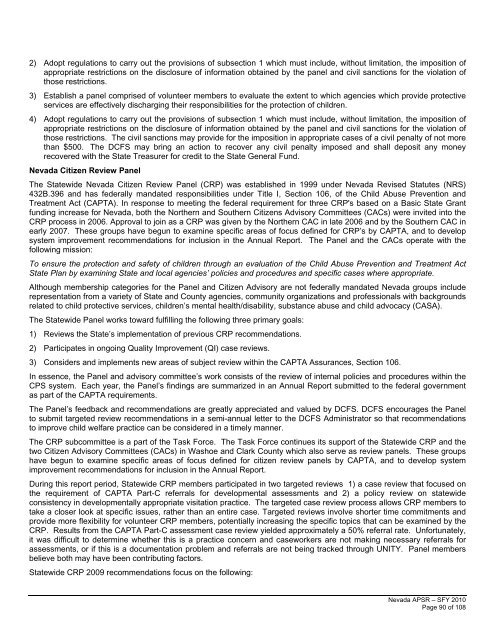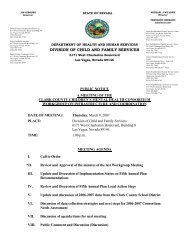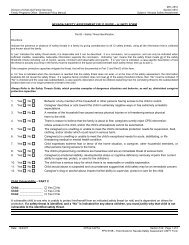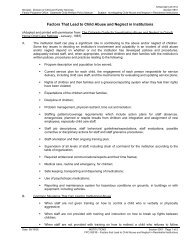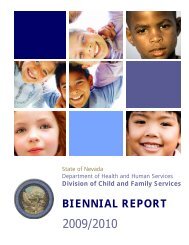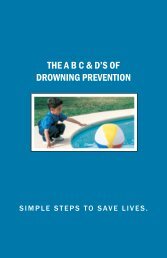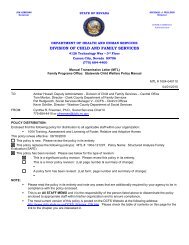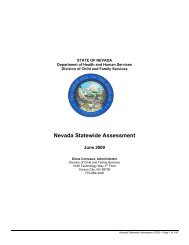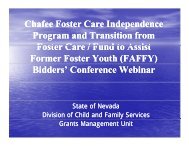STATE OF NEVADA - Division of Child and Family Services
STATE OF NEVADA - Division of Child and Family Services
STATE OF NEVADA - Division of Child and Family Services
Create successful ePaper yourself
Turn your PDF publications into a flip-book with our unique Google optimized e-Paper software.
2) Adopt regulations to carry out the provisions <strong>of</strong> subsection 1 which must include, without limitation, the imposition <strong>of</strong><br />
appropriate restrictions on the disclosure <strong>of</strong> information obtained by the panel <strong>and</strong> civil sanctions for the violation <strong>of</strong><br />
those restrictions.<br />
3) Establish a panel comprised <strong>of</strong> volunteer members to evaluate the extent to which agencies which provide protective<br />
services are effectively discharging their responsibilities for the protection <strong>of</strong> children.<br />
4) Adopt regulations to carry out the provisions <strong>of</strong> subsection 1 which must include, without limitation, the imposition <strong>of</strong><br />
appropriate restrictions on the disclosure <strong>of</strong> information obtained by the panel <strong>and</strong> civil sanctions for the violation <strong>of</strong><br />
those restrictions. The civil sanctions may provide for the imposition in appropriate cases <strong>of</strong> a civil penalty <strong>of</strong> not more<br />
than $500. The DCFS may bring an action to recover any civil penalty imposed <strong>and</strong> shall deposit any money<br />
recovered with the State Treasurer for credit to the State General Fund.<br />
Nevada Citizen Review Panel<br />
The Statewide Nevada Citizen Review Panel (CRP) was established in 1999 under Nevada Revised Statutes (NRS)<br />
432B.396 <strong>and</strong> has federally m<strong>and</strong>ated responsibilities under Title I, Section 106, <strong>of</strong> the <strong>Child</strong> Abuse Prevention <strong>and</strong><br />
Treatment Act (CAPTA). In response to meeting the federal requirement for three CRP's based on a Basic State Grant<br />
funding increase for Nevada, both the Northern <strong>and</strong> Southern Citizens Advisory Committees (CACs) were invited into the<br />
CRP process in 2006. Approval to join as a CRP was given by the Northern CAC in late 2006 <strong>and</strong> by the Southern CAC in<br />
early 2007. These groups have begun to examine specific areas <strong>of</strong> focus defined for CRP’s by CAPTA, <strong>and</strong> to develop<br />
system improvement recommendations for inclusion in the Annual Report. The Panel <strong>and</strong> the CACs operate with the<br />
following mission:<br />
To ensure the protection <strong>and</strong> safety <strong>of</strong> children through an evaluation <strong>of</strong> the <strong>Child</strong> Abuse Prevention <strong>and</strong> Treatment Act<br />
State Plan by examining State <strong>and</strong> local agencies’ policies <strong>and</strong> procedures <strong>and</strong> specific cases where appropriate.<br />
Although membership categories for the Panel <strong>and</strong> Citizen Advisory are not federally m<strong>and</strong>ated Nevada groups include<br />
representation from a variety <strong>of</strong> State <strong>and</strong> County agencies, community organizations <strong>and</strong> pr<strong>of</strong>essionals with backgrounds<br />
related to child protective services, children’s mental health/disability, substance abuse <strong>and</strong> child advocacy (CASA).<br />
The Statewide Panel works toward fulfilling the following three primary goals:<br />
1) Reviews the State’s implementation <strong>of</strong> previous CRP recommendations.<br />
2) Participates in ongoing Quality Improvement (QI) case reviews.<br />
3) Considers <strong>and</strong> implements new areas <strong>of</strong> subject review within the CAPTA Assurances, Section 106.<br />
In essence, the Panel <strong>and</strong> advisory committee’s work consists <strong>of</strong> the review <strong>of</strong> internal policies <strong>and</strong> procedures within the<br />
CPS system. Each year, the Panel’s findings are summarized in an Annual Report submitted to the federal government<br />
as part <strong>of</strong> the CAPTA requirements.<br />
The Panel’s feedback <strong>and</strong> recommendations are greatly appreciated <strong>and</strong> valued by DCFS. DCFS encourages the Panel<br />
to submit targeted review recommendations in a semi-annual letter to the DCFS Administrator so that recommendations<br />
to improve child welfare practice can be considered in a timely manner.<br />
The CRP subcommittee is a part <strong>of</strong> the Task Force. The Task Force continues its support <strong>of</strong> the Statewide CRP <strong>and</strong> the<br />
two Citizen Advisory Committees (CACs) in Washoe <strong>and</strong> Clark County which also serve as review panels. These groups<br />
have begun to examine specific areas <strong>of</strong> focus defined for citizen review panels by CAPTA, <strong>and</strong> to develop system<br />
improvement recommendations for inclusion in the Annual Report.<br />
During this report period, Statewide CRP members participated in two targeted reviews 1) a case review that focused on<br />
the requirement <strong>of</strong> CAPTA Part-C referrals for developmental assessments <strong>and</strong> 2) a policy review on statewide<br />
consistency in developmentally appropriate visitation practice. The targeted case review process allows CRP members to<br />
take a closer look at specific issues, rather than an entire case. Targeted reviews involve shorter time commitments <strong>and</strong><br />
provide more flexibility for volunteer CRP members, potentially increasing the specific topics that can be examined by the<br />
CRP. Results from the CAPTA Part-C assessment case review yielded approximately a 50% referral rate. Unfortunately,<br />
it was difficult to determine whether this is a practice concern <strong>and</strong> caseworkers are not making necessary referrals for<br />
assessments, or if this is a documentation problem <strong>and</strong> referrals are not being tracked through UNITY. Panel members<br />
believe both may have been contributing factors.<br />
Statewide CRP 2009 recommendations focus on the following:<br />
Nevada APSR – SFY 2010<br />
Page 90 <strong>of</strong> 108


